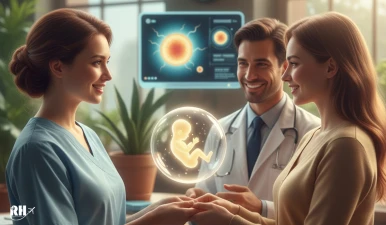Side Effects of Egg Donation: Is Donating Eggs Worth It?
Fertility Treatment
Egg donation is one of the many fertility treatments practiced in Iran and other countries. This procedure has multiple steps and must be done by experienced medical teams. Many egg donors worry whether egg donation can seriously harm their general health and fertility. The short answer is no! If the procedure is done by the book and in a licensed medical center, it doesn’t cause serious issues for the donors. In this article, we enumerate possible side effects of egg donation and explain how it affects donors’ physical and mental health.
Is Egg Donation Harmful for the Donor?
Most people believe that donating eggs can lead to infertility or early menopause. That is a wrong belief! In fact, if the donor meets the necessary health requirements and the entire process is done at a well-equipped hospital/clinic, there is no danger to the donor.
A donor should be between 20 and 30 years old, be in good physical and mental health, and pass all required medical tests and ultrasounds. If the medical team checks all the boxes, egg donation will not cause any damage or long-term problems for her.
Short-Term Side Effects of Egg Donation
Women who wish to donate eggs must take different medical tests. As soon as a fertility specialist approves them, they should start taking hormonal medications to help their ovaries produce mature eggs. These ovulation induction drugs usually contain HCG, FSH, and GnRH, so they cause moderate discomforts, which are usually not serious and go away with rest.
Here are some of the common short-term side effects of egg donation:
- Most women experience temporary bloating, abdominal discomfort, breast tenderness, and slight weight gain. These symptoms are similar to those that happen during a menstrual period.
- Ovarian Hyperstimulation Syndrome (OHSS) is a less common but more serious complication of egg donation. In OHSS, the ovaries swell, and the donor experiences severe bloating, shortness of breath, nausea, or sudden weight gain.
- Some people may also have headaches, nausea, or appetite changes (either loss of appetite or increased hunger). Eating light and simple meals can help reduce these issues.
- Sometimes, the injection site becomes red, itchy, or bruised. This is a rare complication that disappears after a few days.
- Some donors may also experience mood swings, anxiety, or moderate depression. These side effects of egg donation are serious but can be managed by daily workouts, a balanced diet, meditation, and getting enough rest.
/15_1761543827_large.webp)
/15_1761543827_large.webp)
Complications of Egg Retrieval
The egg retrieval procedure takes about 20 minutes and is done under local anesthesia. Therefore, its risks are very low, and in most cases, the donors can get back to work within one or two days. However, some of them may experience temporary physical or mental problems, such as:
- Low blood pressure, nausea, or headaches, which usually go away within a few days.
- Although rare, some donors face allergic reactions (anaphylaxis), breathing difficulties, or nerve damage after egg retrieval.
- Tiredness, nausea, and abdominal pain are the most common complications of egg collection. These symptoms generally disappear in three days with rest and mild painkillers.
- In less than 0.1% of cases, the procedure causes damage to internal organs (like intestines or bladder) or leads to pelvic infection or bleeding. However, if the procedure is done in a specialized clinic by experienced doctors, the risk of these complications is almost zero.
/16_1761543905_large.webp)
Long-Term Side Effects of Egg Donation
Although most donors do not experience long-term side effects of egg donation, many of them still worry about those complications that last more than a couple of days. For example, some wonder whether taking ovarian induction drugs every day increases the risk of ovarian cancer or affects their fertility.
In recent years, this topic has been studied carefully. The good news is that, so far, no definite evidence has been found to support these concerns. Studies have not shown any clear link between egg donation, the use of fertility medications, and serious health problems.
However, since the long-term side effects of egg donation require more research, the donors should be cautious about their medications and doctor.
- Always choose a reputable medical center for the procedure.
- Make sure to complete all required tests before taking medications or donating eggs.
- Get regular checkups.
- Be clear about your family medical history, especially regarding their reproductive health.
/18_1761544073_large.webp)
Psychological Effects of Egg Donation
After egg donation, some women experience psychological problems such as anxiety, regret, depression, and uncertainty. The level of their emotional stress depends on factors like their personal, social, and family conditions. It’s very important that egg donors receive support from their family and friends and understand that what they have done is a kind and generous act that helps others.
In most clinics, women also receive professional counseling before and during the donation process. The counselling sessions are very helpful, as the donors feel more confident and emotionally prepared to go through the procedure.
/17_1761543978_large.webp)
A Quick Review
Egg donation is a kind of fertility treatment, which is practiced in only some parts of the world. This procedure is considered safe because it has no serious risk for either the egg donor or receiver. However, some donors may experience mild, short-term side effects such as headaches, bloating, or nausea. In very rare cases also, the donor deals with vaginal bleeding or infection, but the chances are very low. The most important thing in the egg donation process is to choose a licensed and well-known medical center that follows the safety and health standards.
Contact us for a free initial consultation about Egg donation
FAQs
What are the side effects of egg donation?
When the donor is taking ovulation induction drugs, she might experience different symptoms such as headaches, pain in the lower abdomen, nausea, and bloating. These problems usually last for a couple of days after the procedure, but they eventually go away on their own.
Does egg donation damage the body?
No. If it’s done in a licensed and professional hospital or clinic, it doesn’t damage the donor’s body and fertility.
What should I know before donating eggs?
To prevent serious side effects, take all the ordered tests before the procedure. Also, avoid donating eggs more than six times in total. Bear in mind that only a limited number of eggs should be retrieved during each donation; otherwise, you should deal with the symptoms of OHSS.
Does egg donation cause gynecologic cancer?
Massive research has been done on this topic, but no connection has been found between egg donation and gynecologic cancer.

 WhatsApp
WhatsApp
 Telegram
Telegram
 Facebook
Facebook
 Email
Email

No reviews
Your comment